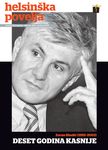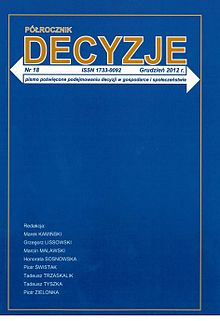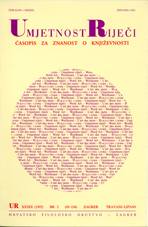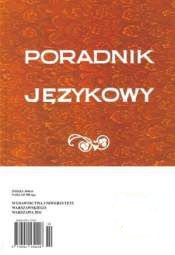


Keywords: Bosnia and Herzegovina; Republika Srpska; Intelligence Security Agency; Federal Intelligence Security; NATO; European Union; Serb Democratic Party; Bosniak Party of Democratic Action; Croatian Democratic Union
Employment policies of Bosnia’s new security service trigger suspicions of political favoritism.
More...
Keywords: corruption; scandal; Miomir Zuzul; Ivo Sanader; Croatian government; Ivan Karin; European Commission; Kolinda Grabar-Kitarovic; European integrationVladimir Drobnjak
Is the old guard of Croatia’s ruling party finally leaving the scene?
More...
Keywords: corruption; decentralize; Gerald A. McDermott; Embedded Politics: Industrial Networks and Institutional Change in Post-Communism; Central Europe; Jeremy Druker
An expert on the economic side of transition offers his observations on some of the lessons learned in Central Europe for the rest of the region.
More...
Keywords: Mikhail Marynich; Richard Boucher; Anatoly Lebedko; United Civic Party; Vintsuk Vyachorka; Belarusian Popular Front; Stanislaw Shushkevich; Belarusian Social Democratic Party Hramada; Syarhey Kalyakin
The Belarusian opposition and Washington loudly decry the guilty verdict against former diplomat and minister Mikhail Marynich.
More...
Keywords: media; media law; Lew Rywin; privatization; Democratic Left Alliance; Eureko; Bank Millennium; Solidarity Electoral Action; Freedom Union; Polish Peasants Party; Marek Belka
Poland’s fashion for media-inspired parliamentary investigations continues, this time into the privatization of the country’s largest insurance company.
More...
Keywords: Orange Revolution; Viktor Yushchenko; Leonid Kuchma; Viktor Yanukovych; Renat Akhmetov; OSCE; Volodymyr Lytvyn; Viktor Medvedchuk; Mykola Azarov
After his victory in Ukraine’s presidential elections comes the hard part for Viktor Yushchenko.
More...
Keywords: information cascades; cooperation; reciprocity; Bayes theorem; social dilemma
When decisions are made sequentially in a group, Bayesian players aiming to maximize individual payoffs often need to ignore their private information and imitate choices of earlier decision makers. This results in information cascades. Once formed, information cascades can be harmful to information aggregation and average payoffs in the group. Therefore, there is a potential dilemma facing players in such situations. They can reveal private information and risk lower immediate payoffs but benefit the group in the long run, or join an information cascade. It has been shown that reciprocity (i.e., paying a cost at one time while being compensated at another) can lead to optimal solutions in such dilemmas. We hypothesized that it would be so for the present one, as well. This hypothesis was tested in an experiment in which we manipulated two factors: the stability of players' positions in a sequence that determined whether reciprocity was possible, and the decision payoff structure that constrained to what extent revealing private information was beneficial to the group. The results show that both factors influenced the probabilities of private information revealing and the group payoffs in ways consistent with our predictions.
More...
Keywords: judgment aggregation; preference aggregation; unanimity preservation; independence; Arrow's theorem.
In the paper we present an introduction to the theory of judgment aggregation and discuss its relation to the theory of preference aggregation. We compare the formal model of judgment aggregation, based on logic, with the formal model of preference aggregation. Finally, we present a theorem in judgment aggregation which is an exact analogue of Arrow's theorem for strict preferences.
More...
Keywords: enrolment; applicants; decision-making
Enrolment is a complex process. There is a number of games that can be distinguished and analysed: universities and faculties compete for applicants, applicants compete to become students, etc. The purpose of this paper was to analyse process of applicants' decision-making. In the first part of this article a model of applicants' decision-making strategies is described. In the second part consequences of applicants' strategic behaviour are examined. According to the presented model secondary school raduates with lower final exams results should avoid choosing the most popular faculties
More...
In der Arbeit werden vier in Kanižlićs Poem Die heilige Rosalia eingebaute, sich vers- und strophenmäßig von dem durch den Alexandriner gekennzeichneten Kontext unterscheidende Gedichte analysiert. Es wird versucht, die Frage zu beantworten, warum der Autor einen Teil der Dichtung metrisch anders gestaltet hat, ob in den drei Sestinen und einem Quatrain eine zusätzliche Bedeutung enthalten ist und was diese uns über Die heilige Rosalia, aber auch uber die gesamte in Gebetbüchern und Katechismen verstreute Lyrik des Dichters Kanižlić zu sagen hat. Schließlich wird aufgrund der vier Gedichte auf Kanižlićs Auffassung des zweifach gereimten Alexandriners sowie auf seine Einstellung zur Funktion der Literatur in Slawonien des achtzehnten lahrhunderts und zur Frage der Unabhängigkeit des Dichters hingewiesen.
More...
In the second part of his review of ancient rhetoric the author deals mainly with Roman rhetoricians from Cicero, Quintilian to Tacitus (in his Dialogue on Orators). Most of these rhetoricians emphasize that the orator must be a person of wide knowledge, that the principle of propriety and urbanity is of supreme importance and, above all, that the orator must be a man of absolute integrity.
More...
If in Childhood in Agram by Miroslav Krleža we disregard the temporal level of narration, which can be considered as the present time, what remains - and this is the level of narration based on the strategy of remembrance - leaves the impression of an attempt of aloose chronology in which sensory data and not biographical facts are strung together. Krleža deliberately reduces the reality of his childhood to the aspects accessible to sensory perceptions, to »images« resisting conceptual interpretation and attempts to place them in a logical order. This is the result of Krleža's conviction that there is no transcendent being so that the totality of existence cannot be understood by reason but by the body. The paper endeavours to show how Krleža is solving the difficulty of finding verbal equivalence for his sensory experience.
More...
Der Aufsatz handelt vom Begriff der Spiegelsymmetrie als eines der Aufbauprinzipien in der Lyrik. Zunächst wird auf den bisherigen Gebrauch dieses Terminus (in den Studien von B. Vuletić, J. Faryno, Z. G. Minc und E. G. Melnikow) hingewiesen, worauf dann - im zweiten Teil des Aufsatzes - an den Beispielen aus der kroatischen und russischen Lyrik (Jure Kaštelan und Ossip Mandelstam) versucht wird, allgemeinere theoretische Gesetzmäßigkeiten (oder zumindest Regelmäßigkeiten) hinsichtlich der Spiegelkompasition herauszuarbeiten. Eine dieser Erkenntnisse besteht darin, daß man die Sinnwelt des lyrischen Gedichts nicht allein als räumliche, sondern auch als zeitliche Spiegelung (Brechung) der einzelnen verbalsemantischen Kompanenten des Gedichtes betrachten muß. Besondere Aufmerksmakeit wird der Aufbauanaalyse des Gedichts Na rozval'njah, uložennyh solarnoj ... von Mandelstam, eines der umstrittensten in der Slawistik, gewidmet.
More...
Keywords: cudzysłów; gry komputerowe; gra komputerowa; gracz; gracze; computer games; players; inverted commas
The article analyzes one of linguistic features which are characteristic for computer games players, namely non-standard usage of inverted commas in texts concerning computer games. The author studies its usage in order to distinguish notions typical of a certain domain and to emphasize the speaker’s distance towards certain elements of his own utterances. There is a presentation of connections between the use of inverted commas and the players’ search for ways to describe the player’s interaction with some elements of the game world. The uniqueness of the language of computer game players has been presented and based on the material concerning adventure games created for personal computers (articles from selected magazines and Wielka encyclopedia gier DVD 2007 (‘Great Encyclopedia of DVD Games 2007’, game user’s manuals and opinions of players at internet forums).
More...
Keywords: grupy apozycyjne; staropolska składnia; nazwy toponimiczne; podstawa apozycji; apozycja; Appositional Groups; Old Polish;
The object of analysis in the article is comparison of interior syntax of Old Polish and contemporary appositional groups like miasto Warszawa (the City of Warsaw), rzeka Wisła (the River Vistula), wieś Górki (the village Górki). The analysis of the collected material has proved the occurrence of significant differences between the past and present habit. In Old Polish syntactic agreement between the superior and subjected element was predominant (e.g. albo na gorze Kalwaryje – as on the mountain Carvary), while the syntax of government was rare (e.g. k temu miastu Betsaida – to the town of Betsaid). At present, though, both types of syntax compete with each other, resulting in doublets of similar frequency of usage, especially in the most irregular group of names containing the element miasto (city) (e.g. Urząd Miasta Toruń (the City Council of Toruń) / Nagrody Prezydenta Miasta Torunia (the Awards of the City of Toruń President). Not univocal is also the syntax of apposition with the noun rzeka (river) (e.g. podczas spływu rzeką Wieprz (during the rowing trip down the River Wieprz) / Most na rzece Wieprzu (the bridge over the River Wieprz); w rzece Wiśle (in the Vistula River) / na rzece Wisła (on the Vistula River). It causes hesitations among Polish language users and doubts about which syntactic type is correct. The described habit and opinions of many linguists show that it is not possible to form a univocal rule at present, which would handle the use of appositional groups with the noun ‘miasto’ (‘city’). However, there are more predictable groups containing such elements as: gmina (region), wieś (village), góra (mountain), jezioro (lake) – almost without any exceptions, they are dominated by the syntax of government (e.g. na jeziorze Jeziorak – on Jeziorak Lake).
More...

Keywords: Atlas ogólnosłowiański; Ogólnosłowiański atlas językowy; General Slavonic Atlas; Zuzanna Topolińska;
More...
Keywords: komunikacja; dzieci; kategoria osoby; kategoria liczby; person; number; children;
The paper presents a few selected morphological features of utterances addressed to children. The author is interested in two grammatical categories: ‘person’ and ‘number’ used in verbal forms. The article answers some questions connected with the discussed categories, for example: 1. Why (when we talk to children) do we use verbs in the third person, i.e. Mummy is preparing dinner for you? 2. Why do we use plural forms of verbs (even if the co-situation is totally inadequate), i.e. And now we are changing the nappy. The analysis is based on the linguistic material collected during the so-called participating observation – all the analyzed utterances represent texts created by adults and addressed to infants and toddlers.
More...